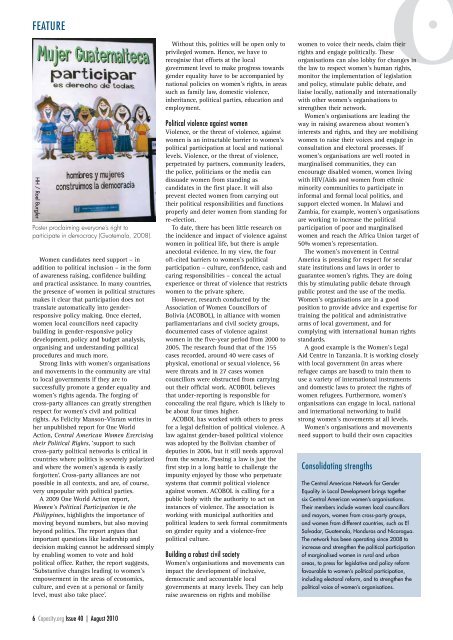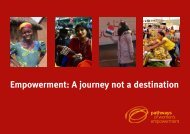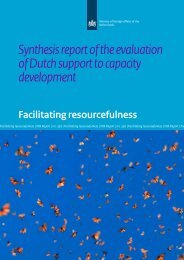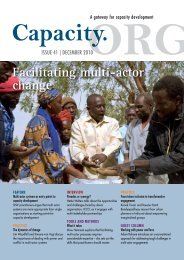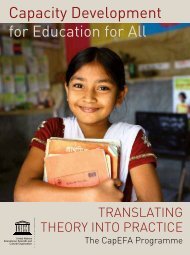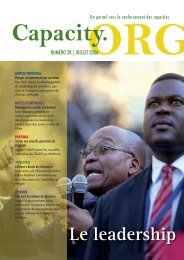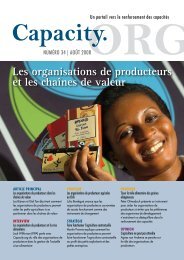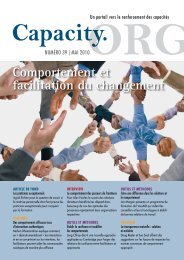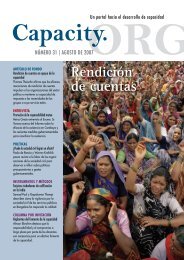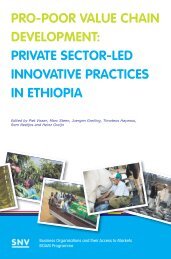Download Local Government For Gender Equality
Download Local Government For Gender Equality
Download Local Government For Gender Equality
Create successful ePaper yourself
Turn your PDF publications into a flip-book with our unique Google optimized e-Paper software.
FEATUREHH / Roel BurglerPoster proclaiming everyone’s right toparticipate in democracy (Guatemala, 2008).Women candidates need support – inaddition to political inclusion – in the formof awareness raising, confidence buildingand practical assistance. In many countries,the presence of women in political structuresmakes it clear that participation does nottranslate automatically into genderresponsivepolicy making. Once elected,women local councillors need capacitybuilding in gender-responsive policydevelopment, policy and budget analysis,organising and understanding politicalprocedures and much more.Strong links with women’s organisationsand movements in the community are vitalto local governments if they are tosuccessfully promote a gender equality andwomen’s rights agenda. The forging ofcross-party alliances can greatly strengthenrespect for women’s civil and politicalrights. As Felicity Manson-Visram writes inher unpublished report for One WorldAction, Central American Women Exercisingtheir Political Rights, ‘support to suchcross-party political networks is critical incountries where politics is severely polarizedand where the women’s agenda is easilyforgotten’. Cross-party alliances are notpossible in all contexts, and are, of course,very unpopular with political parties.A 2009 One World Action report,Women’s Political Participation in thePhilippines, highlights the importance ofmoving beyond numbers, but also movingbeyond politics. The report argues thatimportant questions like leadership anddecision making cannot be addressed simplyby enabling women to vote and holdpolitical office. Rather, the report suggests,‘Substantive changes leading to women’sempowerment in the areas of economics,culture, and even at a personal or familylevel, must also take place’.Without this, politics will be open only toprivileged women. Hence, we have torecognise that efforts at the localgovernment level to make progress towardsgender equality have to be accompanied bynational policies on women’s rights, in areassuch as family law, domestic violence,inheritance, political parties, education andemployment.Political violence against womenViolence, or the threat of violence, againstwomen is an intractable barrier to women’spolitical participation at local and nationallevels. Violence, or the threat of violence,perpetrated by partners, community leaders,the police, politicians or the media candissuade women from standing ascandidates in the first place. It will alsoprevent elected women from carrying outtheir political responsibilities and functionsproperly and deter women from standing forre-election.To date, there has been little research onthe incidence and impact of violence againstwomen in political life, but there is ampleanecdotal evidence. In my view, the fouroft-cited barriers to women’s politicalparticipation – culture, confidence, cash andcaring responsibilities – conceal the actualexperience or threat of violence that restrictswomen to the private sphere.However, research conducted by theAssociation of Women Councillors ofBolivia (ACOBOL), in alliance with womenparliamentarians and civil society groups,documented cases of violence againstwomen in the five-year period from 2000 to2005. The research found that of the 155cases recorded, around 40 were cases ofphysical, emotional or sexual violence, 56were threats and in 27 cases womencouncillors were obstructed from carryingout their official work. ACOBOL believesthat under-reporting is responsible forconcealing the real figure, which is likely tobe about four times higher.ACOBOL has worked with others to pressfor a legal definition of political violence. Alaw against gender-based political violencewas adopted by the Bolivian chamber ofdeputies in 2006, but it still needs approvalfrom the senate. Passing a law is just thefirst step in a long battle to challenge theimpunity enjoyed by those who perpetuatesystems that commit political violenceagainst women. ACOBOL is calling for apublic body with the authority to act oninstances of violence. The association isworking with municipal authorities andpolitical leaders to seek formal commitmentson gender equity and a violence-freepolitical culture.Building a robust civil societyWomen’s organisations and movements canimpact the development of inclusive,democratic and accountable localgovernments at many levels. They can helpraise awareness on rights and mobilisewomen to voice their needs, claim theirrights and engage politically. Theseorganisations can also lobby for changes inthe law to respect women’s human rights,monitor the implementation of legislationand policy, stimulate public debate, andliaise locally, nationally and internationallywith other women’s organisations tostrengthen their network.Women’s organisations are leading theway in raising awareness about women’sinterests and rights, and they are mobilisingwomen to raise their voices and engage inconsultation and electoral processes. Ifwomen’s organisations are well rooted inmarginalised communities, they canencourage disabled women, women livingwith HIV/Aids and women from ethnicminority communities to participate ininformal and formal local politics, andsupport elected women. In Malawi andZambia, for example, women’s organisationsare working to increase the politicalparticipation of poor and marginalisedwomen and reach the Africa Union target of50% women’s representation.The women’s movement in CentralAmerica is pressing for respect for secularstate institutions and laws in order toguarantee women’s rights. They are doingthis by stimulating public debate throughpublic protest and the use of the media.Women’s organisations are in a goodposition to provide advice and expertise fortraining the political and administrativearms of local government, and forcomplying with international human rightsstandards.A good example is the Women’s LegalAid Centre in Tanzania. It is working closelywith local government (in areas whererefugee camps are based) to train them touse a variety of international instrumentsand domestic laws to protect the rights ofwomen refugees. Furthermore, women’sorganisations can engage in local, nationaland international networking to buildstrong women’s movements at all levels.Women’s organisations and movementsneed support to build their own capacitiesConsolidating strengthsThe Central American Network for <strong>Gender</strong><strong>Equality</strong> in <strong>Local</strong> Development brings togethersix Central American women’s organisations.Their members include women local councillorsand mayors, women from cross-party groups,and women from different countries, such as ElSalvador, Guatemala, Honduras and Nicaragua.The network has been operating since 2008 toincrease and strengthen the political participationof marginalised women in rural and urbanareas, to press for legislative and policy reformfavourable to women’s political participation,including electoral reform, and to strengthen thepolitical voice of women’s organisations.6 Capacity.org Issue 40 | August 2010


